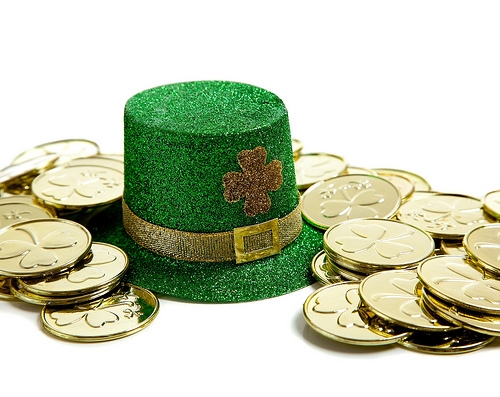
According to the American Association of Endodontists, root canals have a success rate of over 95% and in most cases they last a lifetime.
There are a few factors that ensure the root canal will last and should be followed.
Why do root canals fail?
As mentioned above, only about five percent of root canals fail, and sometimes it is not actually a “failure.” In cases, of teeth that have more than one root, it is possible that only one root was infected and filled. If the remaining root(s) become infected in the future, they will also need a root canal performed on them.
There are a few other reasons why your root canal may fail:
No procedure dental or medical comes with a 100% guarantee to last a lifetime, but if you take care of your treated tooth, the chances of success are great.
If you have any additional questions about root canals and your oral health, be sure to ask a member of our team at our Norwich office.

“St. Patrick’s Day is an enchanted time — a day to begin transforming winter’s dreams into summer’s magic.” Adrienne Cook
Lucky green shamrocks, leprechauns, and pots of gold – it must be St. Patrick’s Day! If you’re not Irish, how do you go about celebrating St. Patrick’s Day? It’s easy: You just put on one of those tall leprechauns hats, dress in green from head to toe, and wear one of those carefree pins that say “Kiss Me, I’m Irish”. On St. Patrick’s Day, everyone is Irish, and that is the universal beauty of the holiday. Celtic pride does not discriminate.
Wondering what our team at Norwich Smiles Family Dentistry is doing to celebrate March 17th? Well, we’ve thought about doing everything from handing out lucky gold coins (you know, the fake ones that are made of chocolate) to shamrock stickers. Maybe we’ll even give away green toothbrushes and floss! You’ll never know unless you come in to see Drs. Doyle, Petropoulos, and Heil !
All kidding aside, St. Patrick’s Day is an important cultural and religious holiday. There are lavish parades and church services across Ireland on March 17th. Over time, however, the holiday has developed into a day to observe Irish culture in general. In places like England and the United States, where there is a large Irish Diaspora, the holiday has greater significance than other countries. From the streets of Boston to St. Patrick’s Cathedral in New York, it is a day of celebration, and many Americans of Irish descent will cook up a traditional meal of corned beef and cabbage.
So, to all of you with Irish ancestry, and to all of you who have decided to be Irish for the day, our office wishes you a Happy St. Patrick’s Day. Good luck looking for a pot of leprechaun gold, which is said to exist at the end of the rainbow. However, keep away from those sugary Lucky Charms; sweet cereals might taste good, but your kids’ teeth might not be feeling too lucky if they eat it for breakfast every day. Have a great St. Paddy’s Day!

It’s estimated that about one in every five people is affected by tinnitus, which is a ringing or noise in the ears. But tinnitus isn’t a condition in itself; it’s actually the symptom of an underlying condition. Some of these underlying conditions could be hearing loss, injury to the ear, or some sort of circulatory disorder.
Another common cause if tinnitus is a dental injury or dental issue, whether it involves the jaw or the temporomandibular joint, better known as the TMJ. “Somatic tinnitus” is the term given to the version that is attributable to injuries to the head or neck area. Symptoms of somatic tinnitus may include noticeable fluctuations in sound volume, intermittency, headaches, memory loss or increased forgetfulness, and an increased likelihood of being depressed or sad.
Drs. Doyle, Petropoulos, and Heil will tell you tinnitus usually isn’t serious and is more common in older populations. For that reason, many people won’t even seek an answer to what’s causing it. But people can also experience more severe cases of tinnitus that can affect a person’s ability to complete everyday activities, which has a larger impact on their lives. For people facing these more severe cases of tinnitus, treatment may be necessary to increase their quality of life. It’s also worth noting that tinnitus seems to worsen with age, so while symptoms might not be a problem one year, they may be more significant and distracting the next.
If you have tinnitus that is caused by the misalignment of the TMJ or an injury to the mouth, that’s a condition that can be corrected by Drs. Doyle, Petropoulos, and Heil and our team at Norwich Smiles Family Dentistry. We will work to relieve your symptoms by realigning the jaw or adjusting your bite with routine dental care. Sometimes we won’t even have to go this far, because an oral infection or gum infection may be causing your problem. We might also recommend other life changes, such as dietary adjustments and medication.
If you’re experiencing tinnitus-like symptoms and have ruled out various other reasons for it, contact our Norwich office today. Drs. Doyle, Petropoulos, and Heil and our team will carefully analyze your situation and put you on a treatment course so that you can kick the symptoms for good.

At Norwich Smiles Family Dentistry, we know the most common oral health diseases are tooth decay and periodontal disease (or gum disease), and both are among the easiest to prevent. One of the most common ways we recommend to boost your oral health is by improving your diet, because you (and your mouth) truly are what you eat. A healthy diet can lead to a healthy mouth and body, while an unhealthy diet can lead to the exact opposite.
The Role Nutrition Plays
While diet is not the only factor that leads to periodontal disease, studies suggest the disease may be more severe among patients whose diets lack essential nutrients. Poor diets will generally lead to a weaker immune system, leaving your body susceptible to all kinds of ailments, including periodontal disease.
A Well-Balanced Approach
There is no “magic” diet that we can recommend to improve your oral health, but the most important thing is to seek a well-balanced approach in your eating. While fad diets that emphasize one food group over another may help you lose weight in the short-term, they probably will not provide all the nutrients your body needs in the long run.
Meals should include a balance of lean meats or other healthy protein sources, colorful fruits and vegetables, whole grains, low-fat dairy, and healthy fats. Foods containing substantial amounts of sugar and salt should be consumed in moderation.
Soda and Sugar: A Dangerous Duo
Millions of gallons of soda are consumed every day in America, but sipping a cold soft drink can be very harmful to your teeth. Many of these beverages wear down the enamel that protects the teeth, which weakens and even destroys them over time. The American Beverage Association estimates that soft drinks account for almost 30 percent of all drink consumption in the U.S., averaging an annual total of about 50 gallons per person (up from only 20 gallons in the 1970s). For healthy teeth and a healthy body overall, try to limit your soda intake.
Sugar is another ubiquitous treat in our daily lives. When we eat sugar, naturally occurring bacteria in our mouths convert it to acids that attack tooth enamel. Consuming too much sugar can swiftly lead to tooth decay, cavities, and gum diseases like gingivitis. Most people do not even realize how much sugar they consume each day. It’s important to limit your daily sugar intake by reading the labels of all the food you eat, and sticking with natural food sources that are low in sugar, especially ones that minimize added sugar, such as fruits and vegetables.
If you have questions about your diet and how it may be affecting your oral health, talk to Drs. Doyle, Petropoulos, and Heil about it. See you soon!